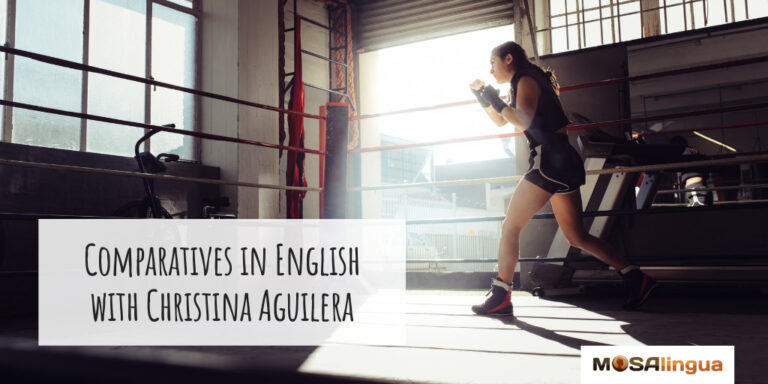Maybe you’ve been learning English for a while now, and you’re getting more confident with building complex sentences. Or maybe you’re just looking to review and sharpen up a few tools you haven’t used in a while. Either way, comparatives are a great way to add nuance to your expression. Even better, comparatives and superlatives are both fairly simple to use, and English speakers employ them all the time, so getting them right is a great easy way to improve your English grammar. In this article, our English instructor Lisa-Joy covers all you need to know to start using comparative adjectives in English, with the help of American singer Christina Aguilera.

How Do English Comparatives and Superlatives Work?
You might have seen comparatives that look like this:
- John is taller than Matt.
- A mouse is smaller than an elephant.
Essentially, in these examples, we’re adding an -er to the end of our adjective, followed by the word than. This tells us that the first noun is more of whatever our adjective says. (ex. John is more tall than Matt.)
You can also use superlatives to take things to the next level. Rather than showing a relationship between two things, a superlative describes the subject in relation to a larger group.
- She is the smartest person in the room.
- Sharks are the most dangerous animals.
Comparatives and Superlatives in English: Quick Review
There are a few different ways to employ a comparative or superlative, depending on what you’re comparing. The form you use will also depend on how many syllables there are in the adjective that you’re using to compare your subjects.
One-syllable adjectives
If you’re building a comparison using a one-syllable adjective, add -er + than to your adjective.
➕ If you’re expressing a positive superlative (for example, the highest of the group, or the most of something), add the before your adjective, then -est to the end of the adjective.
➖ For a negative superlative (for example, the lowest of the group, or the least of something), either add the words the least before the adjective, or find the adjective that is the opposite of what is being measured, and turn it into a positive superlative (ex. strong vs. weak).
| Adjective | Comparative | Superlative |
|---|---|---|
| strong | stronger | strongest |
| fast | faster | fastest |
| big | bigger | biggest |
| thin | thinner | thinnest |
- I am stronger than you.
- Kayla is the strongest player on the team.
- You are the least strong. / You are the weakest.
Two-syllable adjectives
If you’re building a comparison using a two-syllable adjective, you’ll either add -er + than to your adjective, or put the word more in front of the adjective and follow it with than. In many cases, both forms are acceptable, but there’s usually one form that’s more common than the other.
If you’re expressing a superlative, either add the before your adjective, then -est to the end of the adjective or put the words the most/the least in front of the adjective.
💡 MosaTip: If the adjective you’re using ends in a y, switch it to an i before adding your endings!
| Adjective | Comparative | Superlative |
|---|---|---|
| easy | easier | easiest |
| spicy | spicier | spiciest |
| upset | more upset | most upset |
| confused | more confused | most confused |
- The red sauce is spicier than the green sauce.
- That is the spiciest pepper I’ve ever eaten!
Three-syllable (or more) adjectives
Finally, if you’re using an adjective that has three or more syllables, you don’t have to worry about adding -er at the end. Just put the word more or less before it, followed by than to form the comparative. Add the words the most/the least for the superlative.
For example:
| Adjective | Comparative | Superlative |
|---|---|---|
| intelligent | more intelligent | most intelligent |
| determined | more determined | most determined |
| talented | more talented | most talented |
| obnoxious | more obnoxious | most obnoxious |
- The player was less talented than the coach.
- I was the least talented trumpet player.
Comparisons of equality and inequality
When you’re comparing two things that are equal, use as + adjective + as.
For example:
- Her house is as big as mine.
- That song is as annoying as the last.
Or to say that something is not equal to another, you can use not as + adjective + as. For example:
- It’s not as rainy today as it was yesterday.
🎶🎤 A Musical Example: “Fighter” by Christina Aguilera
Those are the basics.
But there are also other ways to compare things in English. Today, we’re going to use American pop singer Christina Aguilera’s song “Fighter” as a model to show us a few different examples.
After all you put me through
You’d think I’d despise you
But in the end, I wanna thank you
Cause you made me that much stronger.
Let’s learn some other ways to use the comparative form of adjectives, in a real-life context—a song! Here are a few lines from the song “Fighter”:
So thanks for making me a fighter
Made me learn a little bit faster,
Made my skin a little bit thicker,
Makes me that much smarter.Makes me that much stronger,
Makes me work a little bit harder,
Makes me that much wiser.
English Comparatives: Adding Intensity
Christina uses determiners to add more or less intensity to the comparisons in her lyrics.
She uses “a little bit” to show a small difference in intensity. Adding the word “much” to a comparison shows that there is a great difference in intensity.
Here are a few other phrases you can use to add more nuance to your comparisons:
For small differences:
- slightly
- a little
- a bit
- a little bit
- not much
For large differences:
- much
- so much
- that much
- a lot
- even
- far
If we take a couple of lines from the song and try out a few different determiners, we get:
- It made my skin slightly thicker.
- It made my skin a little thicker.
- It made my skin a bit thicker.
- It made my skin a little bit thicker.
- It made my skin not much thicker.
🤔 Did you know? “To have thick skin” is an idiomatic expression that means you are not easily hurt or offended by criticism.
- Makes me that much smarter.
- Makes me so much smarter.
- Makes me a lot smarter.
How to Shorten a Comparative Sentence
A comparative sentence often has two parts, but it doesn’t have to be that way.
In the sentence “I am stronger than you,” the first part is “I am stronger,” and the second part is “than you.”
According to the situation and the context, you can shorten the sentence to only the first part. This leaves you with: “I am stronger.”
It’s still a comparison, but it’s less specific. Without context, we don’t know exactly who or what you’re stronger than. This construction appears a lot in Christina’s song. In this case, she’s comparing her current self with her past self (who she was before she met this person).
Bonus Video: English Comparatives
You can find all of these explanations in Lisa-Joy’s video. It’s in English, but subtitles are available in French, Spanish, Italian, German, and Portuguese. Just click on the settings gear at the bottom right to turn them on.
Don’t forget to subscribe to our YouTube channel!
Next Steps
If you enjoyed this article, you might also like:
![The Present in English | English Grammar Hacks [VIDEO]](https://www.mosalingua.com/en/files/2018/01/1-300x169.png)



Comments